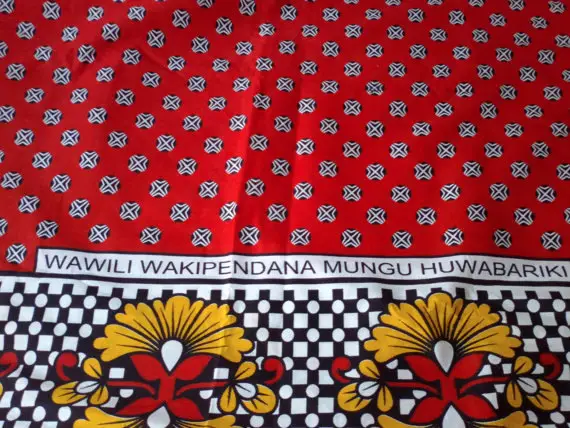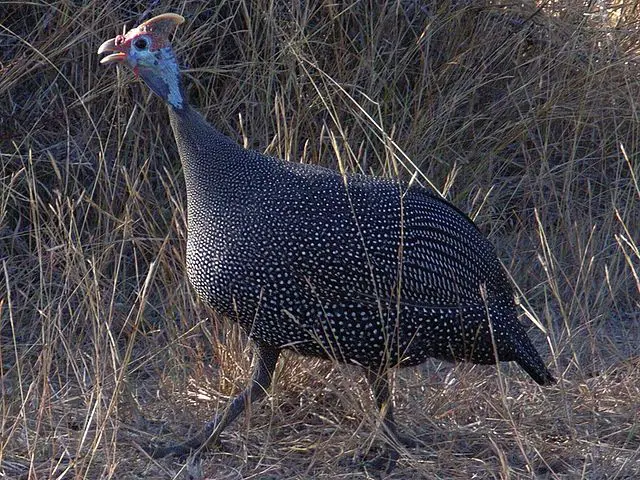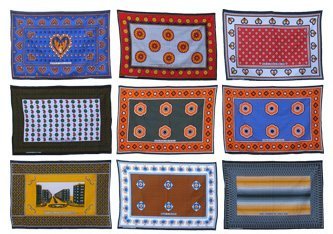Did you come to this post wondering about the word kanga in English? If so, you are in the right place.
Let’s begin with what to call the East African fabric kanga in English.
READ ALSO: The Secret Attraction: What Role Does God Play?
Table of Contents
READ ALSO: My Personal Collection of Kangas & Their Swahili Sayings
Kanga in English Is Called/Kanga in English Name
Quite simply, the East African fabric kanga/khanga remains kanga/khanga in English too.

READ ALSO: Swahili Architecture & Design Style
Kanga Ndege in English Translation/Kanga in English Bird/Ndege Kanga in English/Ndege Kanga kwa Kiingereza/Kanga Mnyama in English
If you are looking for a translation of the Swahili word kanga, and you don’t mean the fabric but the bird, then the word you are looking for is guineafowl.

Do these two Swahili meanings of kanga have any connection? Absolutely! The fabric kanga got its name from the guineafowls that were (and still often are) printed on it.
Now you know!
Kanga Animal
Shanga in English
Shanga is both the singular and plural word for ‘bead’ in Swahili.
Depending on the context, shanga can also be used to refer to strings of beads worn around the waist, also known as waist beads.
What Is a Kanga?
Kanga is an East African cotton fabric with bold designs, bright colors, and a Swahili saying, aphorism, or slogan printed along its bottom border (see the first two images at the start of this post).
Kitenge in English
According to Collins English Dictionary, kitenge in English remains ‘kitenge’. It is, therefore, correct in English to speak of ‘a kitenge dress’ for instance.
In popular culture, kitenge is often referred to as ‘Ankara’ cloth/fabric in English. This is what the fabric is called in Nigeria, and this has seeped into mainstream anglophone speak.
Kanga Meaning in English
Other than the East African fabric, kanga in English can mean a couple of other things.
Kanga Animal in English
In Australia, the word kanga is used informally to mean kangaroo.

Kanga is also another word for a prison warder.
कंगवा in English
कंगवा is the Marathi word for comb.
Njiwa in English
Would you like to know what njiwa another bird name in Swahili means? If so, it would be my pleasure to tell you. Njiwa is the Swahili word for both pigeon & dove.
The rest of this post is about kanga, the fabric.
For as long as I can remember, I have always been a great lover of kanga, the popular Swahili fabric.
How to Wear a Kanga
If you’ve ever seen children wearing kanga wrapped around their bodies and tied behind their necks, then you have a perfect picture of me as a child.
If you were to drop by my house unannounced today and I didn’t have a chance to run and change into something “decent”, then chances are you would find me in a kanga, though this time worn in the kifua style (wrapped around my body, passing under my arms), rather than tied behind my neck.
Why?
For several reasons.
First of all, there’s nothing quite as comfortable as a soft, well-worn, 100%-cotton kanga.
Not sweats.
Not a boubou.
Nothing!
In the Dar es Salaam heat, how better to keep cool? (To be honest, though, it’s not really about the heat. Even in the dead of Canadian winter, I’d crank up the heat so that I could wear a kanga at home. 🙂 )

Also, the bright colors and ornate patterns of kanga somehow always manage to give me an instant mood lift.
Kanga Jinas
Recently, my love for kanga has taken on a new dimension.
Beyond the reasons mentioned above, I’ve now also come to appreciate kangas for their jina (‘name’ in Swahili), which is what the writing on a kanga is called.
Care to know how that happened?
Here goes.
Some years ago, I found that I greatly enjoyed wearing a green and white kanga that I had nipped from my mother ;-).
This was unusual for two reasons: first, I don’t generally like green (especially on clothing) and second, the kanga‘s design was rather plain.
My pleasure in wearing this kanga came from what was written on it, its jina, which read: Mlisema hayawi mbona yamekuwa? (Translation: You said it doesn’t/wouldn’t happen, so how come it did?).
Although this didn’t point directly to something that had already taken place in my life; at the time, I was living an unconventional life, working towards seemingly impossible goals.
I hoped, of course, that I would one day achieve these goals and then be able to ask this question to all the naysayers I’d met along the way.
The kanga’s jina was feisty…and I LOVED it!
From then on, kanga for me ceased to be just about aesthetics and became, too, a form of expression and communication like they have been for countless Swahili-speaking women since the early twentieth century.

Swahili Kanga Sayings Today
A short while ago, I found myself on Uhuru Street, which arguably has the widest selection of kanga in Dar es Salaam.
Although I wasn’t really kanga shopping, I decided to look around and see what was new in the world of kangas.
After discovering some shocking jinas the last time I was kanga shopping, that’s what I decided to focus on this time.
The first thing I noticed was an unusual number of kangas with Islamic jinas, such as Mungu tuzidishie imani tufunge mwezi wa Ramadhani (translation: God, increase our faith so that we fast during the month of Ramadan).
I then remembered my brother telling me, the night before, that the next day would be the first day of Ramadan. (On that note, I wish a successful and spiritually-rich month of Ramadan to all my Muslim readers!). Other jinas that caught my attention were:
- Mzoea nazi samli haiwezi (A person used to coconut oil cannot handle ghee)
- Sibora kitu bora utu (Being humane is better than material things)
- Ukijua kupokea ujue na kutoa (If you know how to receive, then know too how to give)
- Usiniwekee majungu bahati kanipa mungu (Don’t spread rumors about me, my luck is God-given.)
- Njama nimezisikia nangojea vitendo (I’ve heard the evil plans, now I await the actions)
- Msemaukweli ni mpenzi wa mungu (A person who tells the truth is God’s darling.)
- Niko kwangu yanini majungu (I’m in my own home, so why all the nasty rumors?)
- Tuliza roho yako mimi ni wako (Calm your spirit; I am yours)
- Mema na mabaya yapo lakini tusamehane (The good and the bad exist, but let’s forgive each other)
Photo credits: Wikipedia; Tanzania Blog; PanBK at the English-language Wikipedia, eboy, jamiiforums.com; Miwani for Mwanza Mission

Hiya Biche,
I have recently fallen in love with African prints and fabrics, and among these the kanga. I have to say that given my poor grasp of Swahili, I look mostly to the print. Further, as opposed to you, I have my tailor make me something, which means the words are usually hidden or that piece of fabric cut off; I guess I should start urging my tailor to let the words feature prominently from now on (and also make more effort to find out what the ‘jina’ is).
Anyway, kangas are indeed beautiful, and I wish I could go kanga shopping myself but alas, I have to rely on assorted relatives from when they travel to Dar. I suppose there is a place in Kampala but I would imagine the variety is not as wide!
Hey Biche, I beg you!!!! when u next see the one that says Calm your Spirit am yours… please get it for me so i can wear it special for Tata Boy (your BIL). Otherwise you know i have started collecting Kangas… they are just a delight and Comfortable!!!!! they have replaced Nightgowns (too much detail here?) wa they are too comfortable….I am yet to have my first outfit made out of them…. the one i ordered didn’t fit too well unfortunately so I have put it aside till i can come back to my tanzanian Designer..Actually come to think about it my love for kangas is strongly influenced by my cousin and her mother… thank you sooo much for introducing me to them.
thanks, biche. this was a great post. i always enjoy reading kangas, because the more difficult swahili is a great test and tutor of my newest language. i’m subscribing to your blog — always anxious to read what others have to say about tanzania and east africa…
Japo watamba kwangu huna namba is one of my favorites.Love khangas and kikois they are too functional. It is said a proper woman doesn’t travel without one or the other.
@Vive – Please let me not mislead you! As much as a kanga’s jina is interesting and can be significant, I recommend that you continue cutting it out when having an outfit made because it greatly limits what you can do with your kanga if you try to keep its jina right side up (so that it’s easily readable) and unobtrusively placed. What your tailor currently does is the right way to go!
@Julian – It’s my pleasure to nurture your love of kangas. What’s the point of having Tanzanian cousins? 😉 I’ll definitely buy you that kanga when I next see it. I loved it too! Not only was its jina pretty, so too were its design and color. I think you (and Tata Boy) will like it. As for kanga as nightwear, Swahili women are really onto something! 🙂
@JamesBrett – Welcome to ChickAboutTown! I’ve been reading your blog for a while now; it’s nice to see you on mine. I feel the same way about the language aspect of kanga sayings – I always end up learning new words in an attempt to understand what they mean, which brings me to…
@Gish – Thanks for for sharing one of your favorite kanga sayings. Can you translate it please? I’m not sure what watamba means. 🙂 Otherwise, I totally agree with you that kanga and kikoi are so functional!
Thank you, all, for your comments! 🙂
Hello Biche,
I’m Ayumi from Japan.
It was pleasure to find your blog to know african culture.
i found your blog while searching for some information of kanga.
i like them and hopefully i could sell them in japan and do some activity to tell african culture.
thank you for your information and i want cheer you up.
ayumi
Hi Ayumi,
Welcome to ChickAboutTown! Thank your for your message of encouragement. I am glad you enjoyed this post about kanga sayings. You mentioned that you like kanga? Where did you come across them?
Biche
I love your blog and your forays into interesting places. Thanks for sharing your insights and finds.
Hello Biche,
I just discover your blog and i LOVE it!!!
I’m from Comoros Islands and the culture is really really closed to tanzanian culture!!
I don’t suppose you could translate this? “kaseme wewe mimi vikao vimenishinda” i’ve not been able to find a translation and google translate is less than helpful!
It means something like: “You go talk, as for me, I am tired of the meetings”. The context to me sounds like a couple/neighbors/friends/relatives who have been continuously quarreling and taking the dispute for resolution at some sort of council. The wearer of the kanga is saying, she’s tired of all the dispute-resolution meetings and the other party should go ahead without her. It’s a feisty but very amusing (to me) kanga saying.
Anyone want to correct me on my translation?
Oh, and welcome to ChickAboutTown! 🙂
B.
I have a kanga that says: “Radhi ya mama ni sitara ya mwana”. I cannot find a translation. Can you kindly tell me what it says?
Thank you.
Hi Ciel,
Welcome to ChickAboutTown! Sorry for taking so long to get back to you. The word sitara is stumping me a bit so I am asking around for you. Luckily, I live in Dar es Salaam so I should be able to get back to you soon. I’ll let you know as soon as I have a trustworthy translation.
Biche
Hi Biche – great to find yr blog- ive been searching the internet for the meaning of a Kanga i have ” Ya Bingiriya Chunguanguwa” – any ideas would be appreciated- cheers ! ( it might be about ‘oranges’ – but it’s blue black n white, made in Kenya. Ta.
Hi Mike,
Welcome to Chick About Town! Hmmm…the words you have shared with me don’t seem to me to be Swahili. Might they be in another Kenyan language? Or might this be a kanga that was printed to commemorate a special event? The only word that looks like it could be Swahili to me is ‘ya’ which means ‘of’.
Biche